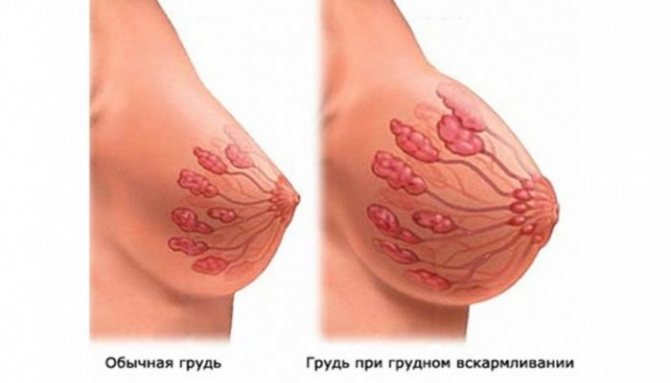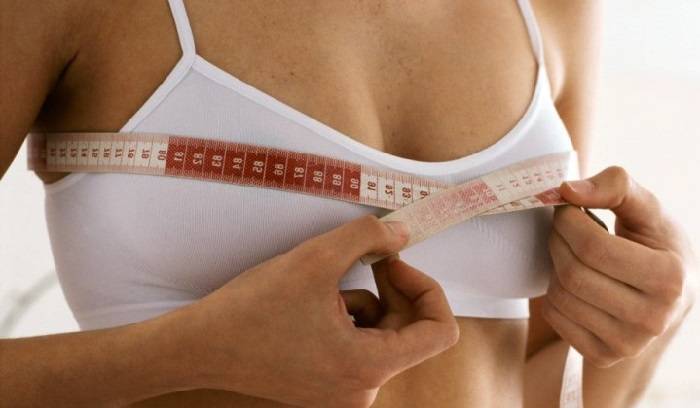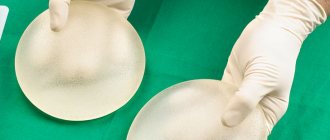Changes occur in a pregnant woman's body, and the expectant mother is faced with a whole range of both familiar and unfamiliar sensations. Not all of them are equally pleasant, and some cause a lot of worry, especially when expecting your first child.
For example, many women notice that their breasts hurt during pregnancy, and this often becomes the reason for an unscheduled visit to the antenatal clinic.
In this article we will talk about why breasts hurt when a woman is expecting a baby, whether such pain is normal, how to distinguish them from pathologies, and whether there are ways to minimize discomfort.
Chest pain: normal or pathological
The first thing to start with is to reassure all pregnant women: chest pain is normal and does not indicate pathology, so you have nothing to worry about.
In this case, the occurrence of unpleasant sensations is caused by natural changes that occur in the mammary glands.
After conception, the level of the hormone progesterone, which is responsible for the normal course of pregnancy, increases in the body, as well as prolactin, the amount of which increases several times. When this happens, the glands begin to “ripen” and rebuild in order to prepare for the feeding period.
It is because of prolactin, the concentration of which is especially high in the first trimester, that the chest hurts in the early stages. Often, the occurrence of such sensations is even a means of self-diagnosis, thanks to which a woman can understand that conception has taken place even before the first delay.
Each woman’s body is individual, and the sensations accompanying pregnancy will be different for each expectant mother.
Why do breasts hurt at the beginning of pregnancy?
In many cases, from the first days of pregnancy, a woman’s breasts undergo quite significant changes. They are considered one of the most reliable and early symptoms of pregnancy. And this happens because the level of sex hormones in the blood increases, and very strongly. Under the influence of the pregnancy hormone, which is called human chorionic gonadotropin (hCG), the breasts increase quite significantly in size (both the mammary glands themselves and the fatty tissues). HCG makes the breasts feel heavy and even begin to swell. Sometimes this is accompanied by the appearance of a vein network, since the flow of blood to this organ increases.
Some women experience swollen or darkened nipples early in pregnancy. They even begin to secrete colostrum. In addition to all this, the breasts and nipples become very sensitive and painful. Often even touching the breast causes pain and discomfort.
But there is no need to worry about this, since this is a completely normal phenomenon that accompanies pregnancy. Be patient, because in this way the breasts are preparing for the future feeding of the child. All of the above symptoms are a kind of improvement in the mammary glands during the period of bearing a baby. By the way, all women who have experienced and experienced these symptoms become less susceptible to cancer in the future.
More on the topic
Breast pain during pregnancy
Sore breasts are a sign of pregnancy
Breasts in early pregnancy
Breasts during pregnancy
Breast massage after childbirth
Individuality of breast changes during pregnancy
Women should be aware that not all pregnant women will experience breast changes. Some ladies feel them very strongly, others say that the breasts become sensitive only when touched, they hurt as much as before the onset of menstruation, and others do not notice any deviations from their usual state at all. That is why this process is purely individual. By the way, changes in the breasts during pregnancy depend on heredity. If your mother’s breasts did not change during pregnancy, then most likely this will not happen to you either.
When to see a doctor
The range of sensations in the mammary glands is quite wide: it is not only pain, but also swelling when the breasts enlarge during pregnancy, burning, changes in the color of the nipples, and the appearance of colostrum from them - a colorless or whitish sticky liquid.
Also, many women are faced with the fact that the breasts have become hypersensitive, or very dense, or even a venous network appears on it. All of these are not considered symptoms requiring a visit to a specialist.
But it is better to visit a doctor if:
- Discharge from the chest of an unnatural color - yellow, purulent, or reddish, with blood.
- Lumps appeared only in one part of the chest - nodules or bumps that can be felt upon palpation.
- Against the background of chest pain, the temperature rose and chills appeared.
Most often, during pregnancy, both breasts hurt equally. But it may also be that only one breast will hurt. This is also normal and is associated with the process of breast development, which occurred during adolescence (breasts can “mature” at different speeds, be of different sizes, etc.).
When does chest pain start and stop?
Now let's talk about the timing when breast pain starts and stops during pregnancy. Let us present the average data and once again remind you that not every woman “fits in” with the statistics, and therefore deviations from them are not a cause for alarm.
As a rule, breasts begin to hurt within a few days after conception. When a newly fertilized egg attaches to the wall in the uterine cavity, the body begins to produce the hormone progesterone, the amount of which rapidly increases day by day in geometric progression.
Often, breast pain in the early stages of pregnancy is very similar to the sensations that girls experience when their period approaches, so this is not the most reliable way to find out about pregnancy.
For most women, chest pain does not go away throughout the first trimester, during a period of particularly active hormone production, and subsides at 10-12 weeks.
However, for some they may continue throughout pregnancy. This is also considered normal and is associated with the development of the mammary glands and the sensitivity of the pain threshold.
Mammary gland

Most expectant mothers experience breast pain during pregnancy. This is due to the peculiarities of their structure and certain processes occurring during this period.
As you know, a woman’s breasts consist of fatty and glandular tissue. Structurally, it is represented by lobules and ducts.
The volume of adipose tissue can easily change throughout life. If a woman sticks to a diet and loses weight, her breasts will shrink. With significant weight gain, the shape, on the contrary, will increase.
With glandular tissue everything is different. This part of the mammary glands is responsible for milk production. Its function is regulated by certain hormones. Their fluctuations lead to an increase in lobules and ducts, increased blood flow, production of colostrum and milk, which is manifested by the following symptoms:
- Swelling of the mammary glands in the early stages.
- Their soreness.
- Sometimes oversensitivity.
- Increase in areola size.
- Changes in pigmentation of the nipples and areola.
- Discharge of white fluid from the nipples.
At what stage of pregnancy does breast pain begin? All expectant mothers react individually to bearing a child.
But in general, for the majority, changes in the mammary glands during pregnancy are observed at the same time and are associated with an increase in the content of certain hormones in the body.
Alarming symptoms
To an unprepared expectant mother, the sensations of burning and pulling in the breasts may seem very alarming, but in fact they should not be afraid. But we will tell you further what situations you should be wary of and when to sound the alarm.
The first thing to remember: if you had chest pain and then suddenly stopped, and your breasts became insensitive during the first trimester, you need to go to the doctor.
This may be one of the symptoms:
- Frozen pregnancy. Sometimes the fetus dies for reasons beyond the woman’s control, and then it is important to see a doctor as soon as possible in order to prevent the negative impact of this situation on the woman’s health. Fetal freezing is accompanied by a malfunction in the body, which leads to the fact that such “symptoms” of pregnancy as chest pain disappear.
- Threats of miscarriage due to lack of the hormone progesterone. Perhaps your breasts have stopped hurting because progesterone has stopped “feeding” its changes, and then an urgent visit to the doctor and a course of injections can prevent a miscarriage and save your unborn baby’s life.
- Disorders of the pituitary gland and thyroid gland. These pathological processes also affect hormone levels and can lead to both a sharp loss of sensitivity in the mammary glands and a sharp increase in discomfort. Therefore, it is important to monitor your condition and not ignore such changes. If thyroid and pituitary gland diseases are not detected in time, this will lead to miscarriage.
It is also important to note that such a dangerous pathology as an ectopic pregnancy is “felt” by women in the same way as a regular one. That is, during such a pregnancy, the level of progesterone increases in the same way as it happens during a healthy one, and the breasts, accordingly, will also hurt.
You may suspect something is wrong if you experience a loss of energy or notice pain in the lower abdomen on one side. In this situation, it is important to get an appointment with a gynecologist as soon as possible.
How to relieve chest pain during pregnancy
Regardless of how long your breasts hurt during pregnancy, just a few weeks or all nine months, the expectant mother wants to feel comfortable.
Any painkillers and even most medicinal ointments are not strictly prohibited during pregnancy, but the Its Kids team will not recommend them.
Better pay attention to safe methods of pain relief. We will tell you about them further.

To ensure that your breasts bother you as little as possible during pregnancy, you need to:
- Choose suitable underwear. This is especially true when breasts begin to swell during pregnancy, and all previous bras are simply too small. The underwear should be spacious, without hard bones or decorative elements that irritate the breasts. But at the same time, the bra must support the breasts so that blood circulation in them is not impaired. If your skin has become too sensitive, it is even recommended to sleep in a bra, choosing sports bras without wires.
- Do exercises. Especially during this period, exercises to strengthen the arms and body are recommended - they will help the muscles stay toned and will contribute to the proper functioning of the lymphatic system.
- Wash your breasts daily with cool water no higher than 37 degrees, which will soothe the skin. You can also use decoctions of chamomile and calendula cooled to room temperature to relieve inflammation.
- Do not use cosmetics that dry the skin. You need special soap, which can be purchased in pregnancy stores. Also, do not wash the chest area with a washcloth - this will increase the pain.
- Use a moisturizer, which is also advisable to purchase at a specialty store.
- When releasing colostrum, you need to use special absorbent pads , which can be purchased at the pharmacy. They need to be changed at least every 7-10 hours. If colostrum secretion is intense, you can change it as needed.
When do breasts begin to grow during pregnancy?

So, as already mentioned, hormonal changes in the body during pregnancy make changes to the size and shape of the mammary glands. If we talk about physiological provoking factors, then, for example, progesterone increases the number of alveoli that make up the lobules.
In the last trimester, the hormone prolactin, which is responsible for the production of breast milk, is especially activated.
And at this time, some women note that colostrum appears in them; there is no need to be afraid of this, this is a completely understandable physiological phenomenon.
If we consider changes in the breasts by trimester, we can highlight the following growth features:
- The first trimester is characterized by accelerated growth of the mammary glands. This begins already in the first week, and after a certain period of time the breasts can already increase by 1 size. At this stage, the number of lobules increases and new milk ducts are formed. The skin of the mammary glands will be taut and the nipples will begin to become pigmented. During this period, clinical symptoms are most pronounced. Already from 3 weeks, breast weight can reach up to 400-700 grams.
- Breast enlargement slows down somewhat, because the expansion of the ducts may already reach its peak, but at this time, instead of breast soreness, severe sensitivity of the nipples may appear. Any slightest irritation can contribute to discomfort in this area. During this period, breast weight can reach +700 to the current one.
- In the third trimester, due to the fact that the mammary glands are enlarged, the skin stretches and the sensation of itching occurs. The excretory ducts are clearly visible on the nipples, and the duct itself is increased in size. In addition, colostrum may appear during this period.
It is impossible to say exactly at what time breasts begin to grow, however, if we rely on a woman’s physiology, then in many cases the increase occurs already from the first trimester of pregnancy.
Some pregnant women may notice that they do not experience much breast growth. This may be due to the individual characteristics of the body or to the condition of the adrenal glands, as well as the thyroid gland, which take part in the production of prolactin. In addition, in some pregnant women, the mammary glands may begin to enlarge and grow only in the last trimester, but if this issue is of great concern, you can consult a doctor for advice.










